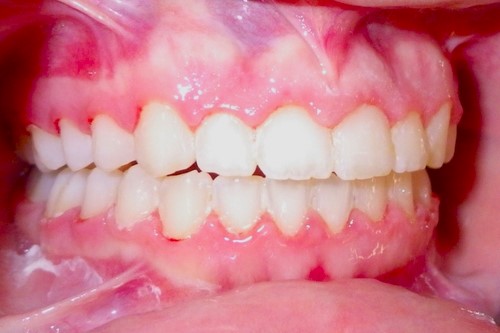
Swollen Gums with Braces: Causes, Solutions, and Prevention
Swollen gums are a common concern for people wearing braces. While braces are an excellent way to achieve a straight smile, they can sometimes lead to gum inflammation, puffiness, or discomfort if proper oral hygiene isn’t maintained. In this guide, we’ll cover why gum swelling happens with braces, how to treat it, and what you can do to prevent it.
Why Do Gums Swell with Braces?
Gum swelling with braces occurs for several reasons, including:
- Plaque Buildup: Braces can make it harder to clean your teeth thoroughly, leading to plaque accumulation and gum inflammation.
- Irritation from Brackets and Wires: The hardware of braces may irritate your gums, causing redness or swelling.
- Gingivitis: Poor oral hygiene can lead to gingivitis, an early stage of gum disease characterized by swollen and tender gums.
- Hormonal Changes: Teenagers with braces may experience gum swelling due to hormonal fluctuations, which increase gum sensitivity.
- Orthodontic Adjustments: Tightening braces can temporarily irritate your gums as your teeth move.
How to Get Rid of Swollen Gums with Braces
Immediate Relief for Swollen Gums
- Rinse with Salt Water: A warm saltwater rinse reduces inflammation and soothes irritated gums. Mix 1 teaspoon of salt in a cup of warm water and swish for 30 seconds.
- Brush and Floss Properly: Use a soft-bristled toothbrush and floss designed for braces, like floss threaders or water flossers, to remove plaque and food particles.
- Apply Orthodontic Wax: Cover any brackets or wires irritating your gums with orthodontic wax.
- Stay Hydrated: Drinking water helps flush away bacteria and keeps your mouth hydrated.
Overnight Remedies
- Hydrogen Peroxide Rinse: Mix equal parts water and 3% hydrogen peroxide, then swish for 30 seconds to reduce bacteria and inflammation.
- Ice Pack: Apply an ice pack to the outside of your cheeks to reduce swelling.
- Over-the-Counter Pain Relievers: Take ibuprofen or acetaminophen if the swelling is painful.
Recommended Products for Gum Care with Braces
- Water Flosser: The Waterpik Aquarius Water Flosser is highly effective at removing plaque and food debris around braces, keeping your gums healthy and reducing swelling.
- Electric Toothbrush: The Oral-B Pro 1000 Electric Toothbrush provides a thorough clean, especially for those wearing braces, helping prevent gum inflammation caused by plaque buildup.
- Mouthwash: Listerine Total Care Anticavity Fluoride Mouthwash offers six dental hygiene benefits, including reducing inflammation and strengthening enamel.
Preventing Swollen Gums with Braces
- Brush After Every Meal: Clean your teeth after eating to prevent plaque buildup.
- Use Interdental Brushes: These tiny brushes clean around brackets and wires, reaching areas a regular toothbrush might miss.
- Floss Daily: Use tools like water flossers to make flossing easier with braces.
- Eat a Balanced Diet: Avoid sugary or sticky foods that can increase plaque.
Related Reading: What Can and Can’t You Eat with Braces - Visit Your Orthodontist Regularly: Regular checkups help address issues like gum swelling before they worsen.
Can Braces Cause Receding Gums?
Braces themselves don’t cause gum recession, but poor oral hygiene or overly aggressive brushing while wearing braces can lead to receding gums. Gum recession occurs when the gum tissue around your teeth wears away, exposing more of the tooth or its root.
Preventing Gum Recession
- Use a soft-bristled toothbrush and gentle circular motions when brushing.
- Avoid using excessive force with floss or interdental brushes.
- Maintain regular dental cleanings to ensure your gums stay healthy.
Is Gum Disease Common with Braces?
If plaque is not effectively removed, it can lead to gum disease, including:
- Gingivitis: The first stage of gum disease, which is reversible with proper care.
- Periodontitis: A more severe form of gum disease that can damage the bone supporting your teeth.
Braces do not cause gum disease, but they can make your gums more susceptible if oral hygiene is neglected.
Related Reading:
Braces Hurt and Common Emergencies: How to Cope and What to Do
When to See Your Orthodontist
If your swollen gums persist despite proper care or are accompanied by severe pain, bleeding, or signs of infection, contact your orthodontist immediately. These symptoms could indicate a more serious issue requiring professional treatment.
Why Choose Elate Orthodontics for Braces?
At Elate Orthodontics, we understand the challenges that come with braces, including gum swelling. Our team provides personalized care and advice to ensure your orthodontic journey is as comfortable as possible. Here’s what makes us unique:
- Expert Orthodontists: We specialize in managing orthodontic care to promote healthy gums and teeth.
- Advanced Technology: From self-ligating braces to Invisalign, we offer options tailored to your needs.
Related Reading: Braces vs. Invisalign for Teens: Choosing the Best Option in Frisco, TX - Convenient Locations: Our offices in The Colony, Frisco, and Prosper make it easy to schedule regular visits.
Helpful Resources
- Affordable Orthodontics in Texas
- Can You Get Your Teeth Cleaned with Braces? A Complete Guide
- Find the Best Orthodontist for Braces in Frisco, TX
Don’t Let Swollen Gums Hold You Back
Swollen gums with braces are manageable and temporary with the right care and support. At Elate Orthodontics, we’re here to guide you every step of the way, ensuring your braces journey leads to a healthy, confident smile. Schedule an appointment with us today to keep your smile on track!



